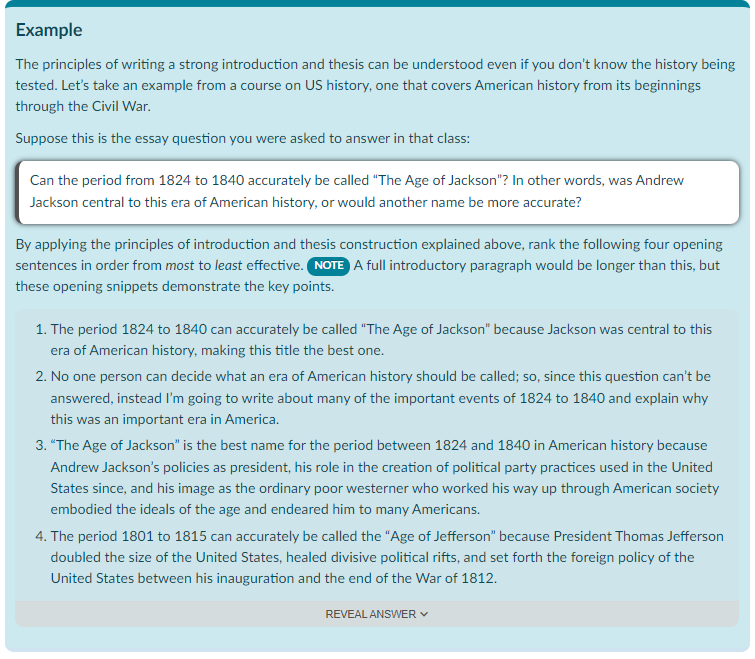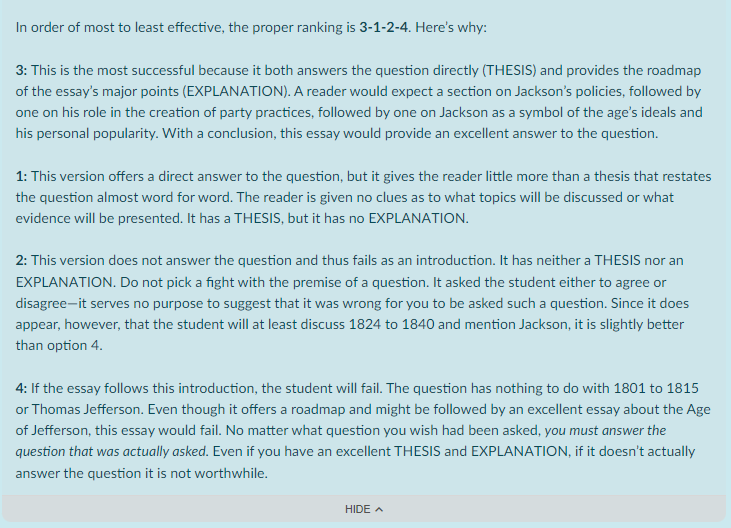Checking Knowledge
Overview
Students are given four example opening sentences in response to an essay prompt and are asked to rank them from most to least effective.
Why Use This?
The examples allow students to quickly and easily check their knowledge of how to write a strong introductory sentence that incorporates both their thesis and an explanation of their essay’s key points. Providing examples like these is a low-effort way to help students write stronger essays and reduce questions and confusion about an assignment.
How Does It Work?
The instructor provides information on how to write a strong introduction and thesis for an essay, including the level of detail needed and several examples. Students are then asked to review four example opening sentences and rank them from most to least effective.
Because students are first asked to rank the examples, the answer is hidden:

Begin long description of previous image
Example
The principles of writing a strong introduction and thesis can be understood even if you don’t know the history being tested. Let’s take an example from a course on US history, one that covers American history from its beginnings through the Civil War.
Suppose this is the essay question you were asked to answer in that class:
Can the period from 1824 to 1840 accurately be called “The Age of Jackson”? In other words, was Andrew Jackson central to this era of American history, or would another name be more accurate?
By applying the principles of introduction and thesis construction explained above, rank the following four opening sentences in order from most to least effective. Note A full introductory paragraph would be longer than this, but these opening snippets demonstrate the key points.
- The period 1824 to 1840 can accurately be called “The Age of Jackson” because Jackson was central to this era of American history, making this title the best one.
- No one person can decide what an era of American history should be called; so, since this question can’t be answered, instead I’m going to write about many of the important events of 1824 to 1840 and explain why this was an important era in America.
- “The Age of Jackson” is the best name for the period between 1824 and 1840 in American history because Andrew Jackson’s policies as president, his role in the creation of political party practices used in the United States since, and his image as the ordinary poor westerner who worked his way up through American society embodied the ideals of the age and endeared him to many Americans.
- The period 1801 to 1815 can accurately be called the “Age of Jefferson” because President Thomas Jefferson doubled the size of the United States, healed divisive political rifts, and set forth the foreign policy of the United States between his inauguration and the end of the War of 1812.
End long description of previous image
Then, when students are ready to check their knowledge, they can reveal the answer and explanation:

Begin long description of previous image
In order of most to least effective, the proper ranking is 3-1-2-4. Here’s why:
3: This is the most successful because it both answers the question directly (THESIS) and provides the roadmap of the essay’s major points (EXPLANATION). A reader would expect a section on Jackson’s policies, followed by one on his role in the creation of party practices, followed by one on Jackson as a symbol of the age’s ideals and his personal popularity. With a conclusion, this essay would provide an excellent answer to the question.
1: This version offers a direct answer to the question, but it gives the reader little more than a thesis that restates the question almost word for word. The reader is given no clues as to what topics will be discussed or what evidence will be presented. It has a THESIS, but it has no EXPLANATION.
2: This version does not answer the question and thus fails as an introduction. It has neither a THESIS nor an EXPLANATION. Do not pick a fight with the premise of a question. It asked the student either to agree or disagree—it serves no purpose to suggest that it was wrong for you to be asked such a question. Since it does appear, however, that the student will at least discuss 1824 to 1840 and mention Jackson, it is slightly better than option 4.
4: If the essay follows this introduction, the student will fail. The question has nothing to do with 1801 to 1815 or Thomas Jefferson. Even though it offers a roadmap and might be followed by an excellent essay about the Age of Jefferson, this essay would fail. No matter what question you wish had been asked, you must answer the question that was actually asked. Even if you have an excellent THESIS and EXPLANATION, if it doesn’t actually answer the question it is not worthwhile.
End long description of previous image